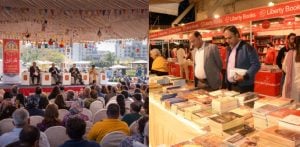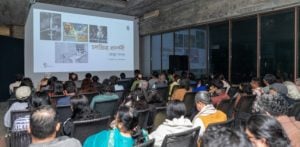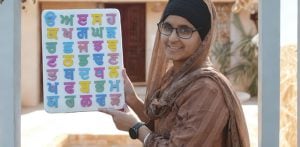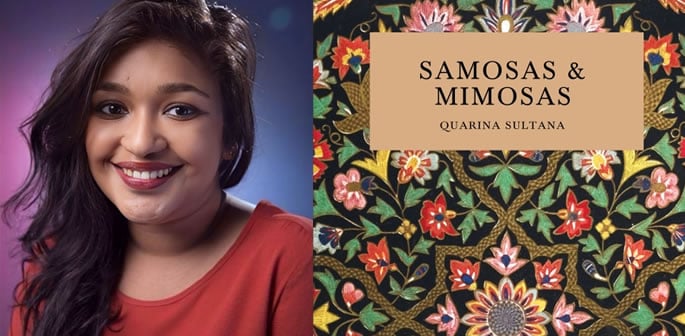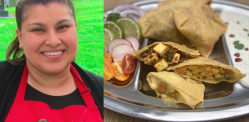"My life felt like a constant balancing act"
Quarina Sultana’s Samosas & Mimosas is a mirror held up to the British South Asian experience, reflecting the joy, absurdity and contradictions of belonging everywhere and nowhere.
In this poetry collection, her words dance between languages, generations and expectations, turning identity crises into punchlines and nostalgia into poetry.
Through sharp humour and tender observation, Sultana invites readers to sip chai with rebellion and laugh through the messiness of being brown and British.
It’s a collection that doesn’t ask for neat answers but celebrates the in-between, where self-doubt, pride and cultural chaos coexist.
In a chat with DESIblitz, Quarina Sultana opens up about what inspired Samosas & Mimosas, how poetry helps her make sense of identity, and why embracing contradiction is an act of defiance.
What inspired you to write Samosas & Mimosas?
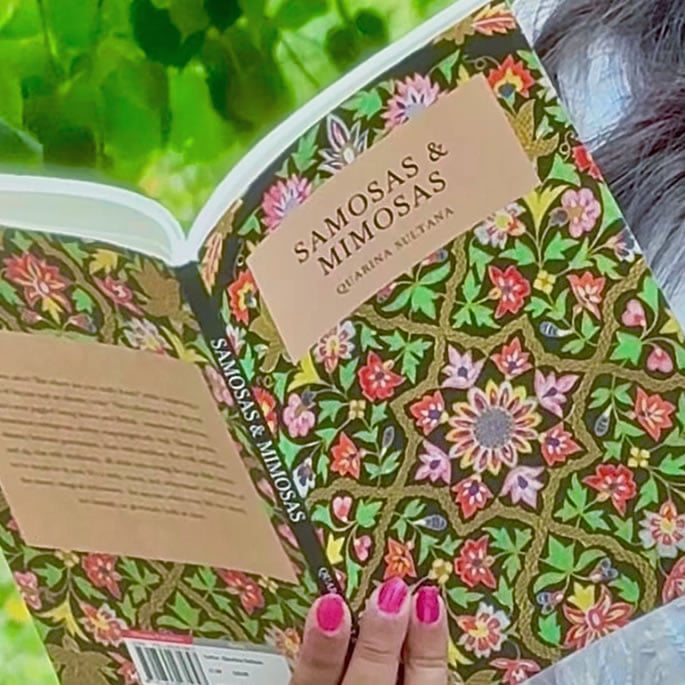
Honestly? I wrote it because I couldn’t find it.
Growing up, I saw plenty of poetry about Partition, colonialism, and radicalisation, but not much about the everyday chaos of being brown and British.
My life felt like a constant balancing act, one hand clutching a samosa, the other holding a mimosa, and yet those in-between moments weren’t showing up in the poetry I was reading.
Samosas & Mimosas is my attempt to bridge that gap: to write poems that are messy, funny, political, tender – poems that taste like home and sound like contradictions.
How does the collection capture being brown and British?
Being brown and British is both beautiful and bizarre.
It’s eating biryani at the beach while your white friends bring sandwiches. It’s chanting Sanskrit in a yoga class in the middle of the British Museum. It’s your auntie telling you your skin’s too dark while your mates are paying £20 for a spray tan.
“The collection leans into that duality – the contradictions, the comedy, the cultural tightrope walk.”
I didn’t want to present some tidy, polished version of “identity”.
I wanted the noise, the mess, the belly laughs, and the heartbreak. Because being brown and British isn’t a monologue; it’s a full-on family dinner with 12 conversations happening at once.
Which poem feels most personal to you, and why?

Two poems, for very different reasons.
Melanin Haze feels like the heartbeat of the whole book. It confronts this idea of our skin as currency head-on, something so many of us live through but rarely get to see in print.
Writing it was painful but necessary, like finally naming an ache you’ve been carrying for years.
It sets the tone for the rest of the collection: unapologetic, vulnerable, unafraid.
Then there’s The Quiet is Too Loud, which aches in a quieter, subtler way.
It’s about losing language, losing sound, losing certain roots you didn’t even realise were slipping away.
That one comes from a softer place, but it’s no less personal.
Together, they’re like two bookends of my life: one about fighting against erasure, the other about mourning what’s already gone.
How do you balance humour with heavier themes of identity?
For me, humour and heaviness aren’t opposites; they’re twins.
Diaspora humour is a survival tool; it’s how we exhale when the weight of racism, colourism, and cultural expectation gets too heavy.
I grew up in a family where jokes happened right in the middle of crisis, where trauma turned into tea-table gossip.
That energy is in my writing.
“One poem might rage against racism, the next might thirst over a man in grey sweatpants. Because that’s real life.”
We don’t live in a single emotion; we live in juxtapositions. Humour doesn’t erase the heaviness; it gives us a way to carry it. Rage gives weight to laughter, and laughter gives oxygen to rage.
What role do generational clashes play in your poetry?

I’m lucky — my parents were never the log kya kahenge kind.
That being said, I still grew up surrounded by the clash.
I saw it in other families, and I felt it in smaller ways – the code-switching of accents, the rules about clothes, the tug-of-war between tradition and independence.
Those generational tensions creep into my poetry, not as finger-pointing but as reflection.
I’m fascinated by how love and conflict can live side by side.
The auntie who tells you to settle down might also be the one sneaking you samosas when your mum says no.
That mix of push and pull, rebellion and reverence, is at the heart of my work.
How has your Bengali heritage shaped your creative process?
Bengali heritage is soaked in poetry.
Our revolutionaries were poets, our music is poetry, our lullabies are poetry.
I grew up on the words of Tagore and Nazrul, with stories of Partition and protest that were half-legend, half-lived.
“It taught me that poetry isn’t a luxury; it’s a weapon, a comfort, a form of memory.”
That inheritance shaped me completely.
It gave me permission to write boldly, politically, lyrically, and to treat poetry not as a private act, but as something communal, something that belongs in kitchens, rallies, and family gatherings as much as it does in books.
What does living “in-between” cultures mean for your writing?
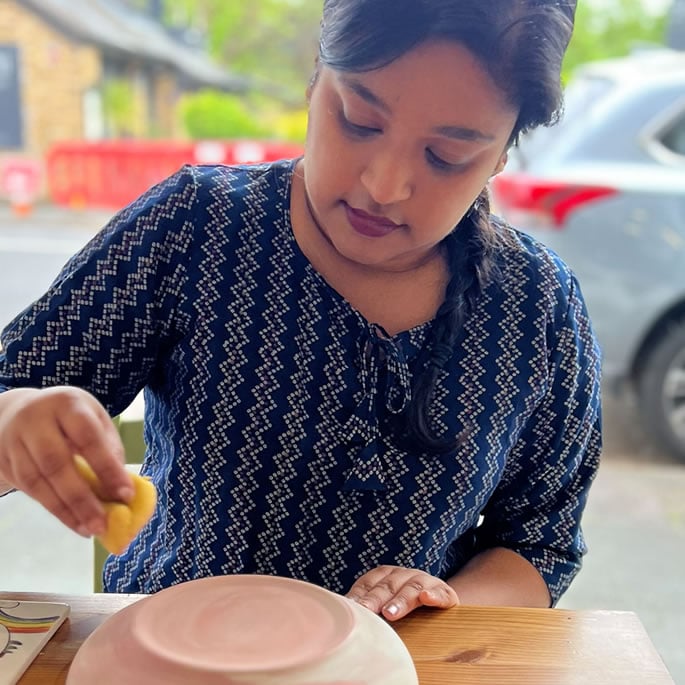
It means I’m always writing from thresholds.
I’m not fully here, not fully there, and so the page becomes the one place where I can hold both without apology.
It gives me a double lens: I can both laugh at and long for rituals, both critique and cherish the same traditions.
Being in-between means I resist neatness in my writing. I don’t want clean resolutions. I want reflection, mess, contradiction.
It means I can write about colonial history one minute and then make fun of Pret sandwiches the next. That restlessness keeps the poetry alive.
How do generational expectations shape the stories in your poetry?
Expectations are almost like another character in my writing.
They’re not always oppressive; sometimes they’re loving, sometimes they’re suffocating, sometimes they’re just funny.
“Be a good daughter.” “Make the family proud.” “Don’t forget where you came from.”
Those refrains echo, even when you don’t want them to.
“For me, poetry is a way of holding those voices up to the light.”
Not to shame them, but to understand them.
Because those expectations aren’t random; they come from histories of survival, migration, sacrifice.
The challenge is to honour that without letting it cage the future.
How do you want readers to feel after reading?
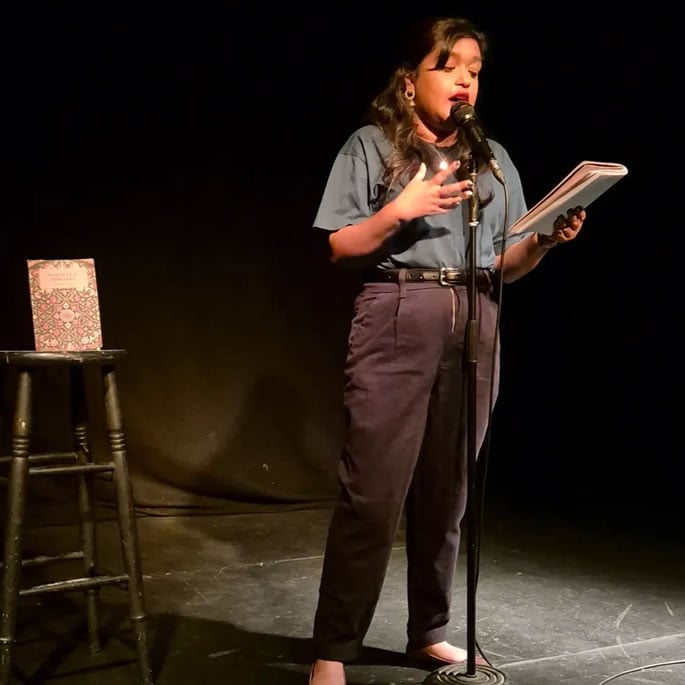
Like they’ve been invited to the most chaotic family dinner table imaginable.
There’s too much food, too many opinions, everyone talking over each other, and yet somehow, you leave feeling full, loved, and the most at home you have in days.
If you share the experience, I want you to feel seen. If you don’t, I want you to feel expanded.
Mostly, I want readers to walk away knowing poetry isn’t this distant, dusty thing. It’s in the everyday and it’s in you.
Samosas & Mimosas is more than a poetry book; it’s a conversation starter for a generation caught between cultures yet rich in stories.
Quarina Sultana’s poetry reminds us that identity isn’t fixed; it’s fluid, funny and constantly evolving.
Her work captures the unfiltered honesty of life lived in the hyphen between brown and British.
As she continues to write, reflect and rebel through words, one thing is clear: the in-between has never felt more like home.



